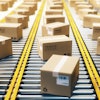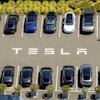The next episode of PBS’s series “America Revealed,” scheduled to air May 2 at 10 p.m. EST, unveils surprising facts about the state of manufacturing in the United States. Instead of documenting what most people think is an industry in serious decline, the series producers and host Yul Kwon found reasons to be exhilarated and optimistic. Among the surprising facts is that American workers manufacture more now than at any time in our history; what we make and how we do it is just different. Manufacturing Business Technology recently spoke with Kwon about his experience documenting the manufacturing industry and what he learned from that experience.
MBT: Can you tell me a little bit about this episode and what it offers to viewers?
Kwon: It is sort of a celebration of American manufacturing. On a personal level, I sort of went into this expecting to find somewhat of a depressing story, because that’s what you read in the headlines. Conventional wisdom suggests America doesn’t make things anymore and all the jobs have gone overseas. We go through different areas of the country and different industries, and what we find is that American manufacturing is still very strong. The value of what we produce today is twice of what it was back in 1990. We also go through a number of stories; we go to a number of companies and talk with the people there. We highlight these companies that have found a way to innovate and grow, as well as leverage technology and automation to reduce cost. At the same time, these companies maintain or grab market share. This whole notion that America doesn’t make things is false. We still make amazing things and there are jobs here. The basic takeaway from this is America is still the most innovative country on the planet, but it just doesn’t look like how traditional manufacturing looked like 20 or 30 years ago.
MBT: In your opinion, what contributes to the negative or pessimistic attitude people have regarding manufacturing today, and why do you feel this is an ill-informed opinion?
Kwon: When you just read the headlines, everyone always thinks manufacturing in this country has gone away. There are a lot of visible consequences. American manufacturing used to be concentrated in a number of cities that were sort of defined by their industry. The shifts in manufacturing have certainly displaced jobs, especially in towns that grew up around one company or one factory. There are large, visible relics of this shift that’s going on. You see lots of vacancies and towns that are in decline. People have lost their jobs in a lot of these places. When you have these personal stories of people that have really had a hard time, I think that makes for easy news. It’s harder to show some of the gains that have been made and the economic output of that industry. It’s harder to find the human face that tells that story. We’ve also gotten into a very politicized climate now. People are looking for victims and stories about why things aren’t working now in this country. We are in this fiscally-challenging climate, but what’s interesting is that American manufacturing is helping to lead us out of that. That’s one thing a lot of people don’t realize. What we’re hoping to do with this episode is get away from all of the politics and really kind of present a clear overview of what American manufacturing looks like today -- without any pre-defined bias or agenda. Manufacturing is a source of pride and strength for our country, and I think that gets lost in the midst of all this doom and gloom.
MBT: When you approach a story and try to learn more about a particular topic, I’m sure you have some thoughts on it heading into things. How has your attitude toward American manufacturing changed since you worked on this episode?
Kwon: I kind of was expecting to find sort of a depressing story. I guess I blindly accepted the conventional wisdom that America doesn’t make stuff anymore and that we import everything. But the reality is that I came away with a profound sense of appreciation and respect for just the hard work and the ingenuity of the people and the systems in this country that produce world-class things. There are certainly places where people have been hit hard by the changes that have been going on, but every person that I met still had a fundamental pride in being American. And they had a fundamental belief in the future and promise of this country. For me, that was incredibly affirming.
MBT: Manufacturing is an incredibly competitive industry these days. When you met with people whose livelihood depends on their success in manufacturing for this episode, did you get the sense that they are up for the challenge of doing what is necessary to stay competitive?
Kwon: Absolutely. One thing we noted is that this whole idea of “Made in America” is evolving. In contrast to this notion that America is not a good place to build things, you’re seeing a lot of foreign auto manufacturers building plants in this country, using American-made parts, and using American labor. If you are looking for low-cost labor, you can go to other countries and train people to do the same thing over and over again. But if you are trying to get higher-skilled labor and people that can handle more complex tasks, then (we were told) America is the best place to go. I think America and American labor can be competitive with anyone in the world. The highest value-added jobs are going to stay in this country. The question is: How can we retrain our workers to have the skill sets they need? If you give them the tools and the opportunity, I have no doubt that they will meet and exceed everyone’s expectations.
MBT: What do you want the audience to take away from the episode and the work you put into producing it?
Kwon: The key takeaway is American manufacturing is strong. It’s going to lead us out of this economic slump, and we’re still the best country in the world at making things.
Yul Kwon is host of the PBS miniseries “America Revealed.” He is also the host of the weekly news program “LinkAsia” on LinkTV. In 2006, Yul became the first Asian American to win the CBS reality show “Survivor.” Following “Survivor,” he worked as a special correspondent for CNN, co-hosted a show for Discovery Channel, and became an adjunct instructor for the FBI, where he helped teach a counterintelligence course on social dynamics. More information regarding “America Revealed” can be found here.

















